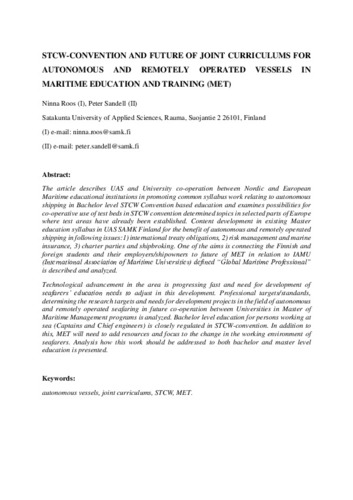Mostra el registre d'ítem simple
STCW-convention and future of joint curriculums for autonomous and remotely operated vessels in maritime education and training (MET)
| dc.contributor.author | Roos, Ninna |
| dc.contributor.author | Sandell, Peter |
| dc.date.accessioned | 2020-10-02T12:03:05Z |
| dc.date.available | 2020-10-02T12:03:05Z |
| dc.date.issued | 2020-09 |
| dc.identifier.citation | Roos, N.; Sandell, P. STCW-convention and future of joint curriculums for autonomous and remotely operated vessels in maritime education and training (MET). A: Martínez, F.X.;Castells, M.; Martín, M.; Puente, J.M. (eds.). "Maritime Transport VIII : proceedings of the 8th International Conference on Maritime Transport : Technology, Innovation and Research : Maritime Transport'20". Barcelona: Universitat Politècnica de Catalunya. Departament de Ciència i Enginyeria Nàutiques, 2020, p. 118-124. ISBN 978-84-9880-827-8. |
| dc.identifier.isbn | 978-84-9880-827-8 |
| dc.identifier.uri | http://hdl.handle.net/2117/329717 |
| dc.description.abstract | The article describes UAS and University co-operation between Nordic and European Maritime educational institutions in promoting common syllabus work relating to autonomous shipping in Bachelor level STCW Convention based education and examines possibilities for co-operative use of test beds in STCW convention determined topics in selected parts of Europe where test areas have already been established. Content development in existing Master education syllabus in UAS SAMK Finland for the benefit of autonomous and remotely operated shipping in following issues:1) international treaty obligations, 2) risk management and marine insurance, 3) charter parties and shipbroking. One of the aims is connecting the Finnish and foreign students and their employers/shipowners to future of MET in relation to IAMU (International Association of Maritime Universities) defined “Global Maritime Professional” is described and analyzed. Technological advancement in the area is progressing fast and need for development of seafarers’ education needs to adjust in this development. Professional targets/standards, determining the research targets and needs for development projects in the field of autonomous and remotely operated seafaring in future co-operation between Universities in Master of Maritime Management programs is analyzed. Bachelor level education for persons working at sea (Captains and Chief engineers) is closely regulated in STCW-convention. In addition to this, MET will need to add resources and focus to the change in the working environment of seafarers. Analysis how this work should be addressed to both bachelor and master level education is presented. |
| dc.language.iso | eng |
| dc.publisher | Universitat Politècnica de Catalunya. Departament de Ciència i Enginyeria Nàutiques |
| dc.rights | Attribution-NonCommercial-NoDerivs 3.0 Spain |
| dc.rights.uri | http://creativecommons.org/licenses/by-nc-nd/3.0/es/ |
| dc.subject | Àrees temàtiques de la UPC::Nàutica::Navegació marítima::Transport marítim |
| dc.subject | Àrees temàtiques de la UPC::Nàutica::Seguretat marítima |
| dc.subject.other | Autonomous vessels |
| dc.subject.other | Joint curriculums |
| dc.subject.other | STCW |
| dc.subject.other | MET |
| dc.title | STCW-convention and future of joint curriculums for autonomous and remotely operated vessels in maritime education and training (MET) |
| dc.type | Conference report |
| dc.subject.lemac | Convenio Internacional sobre Normas de Formación, Titulación y Guardia para la Gente de Mar |
| dc.rights.access | Open Access |
| local.citation.contributor | International Conference on Maritime Transport |
| local.citation.pubplace | Barcelona |
| local.citation.publicationName | Maritime Transport VIII : proceedings of the 8th International Conference on Maritime Transport : Technology, Innovation and Research : Maritime Transport'20 |
| local.citation.startingPage | 118 |
| local.citation.endingPage | 124 |


